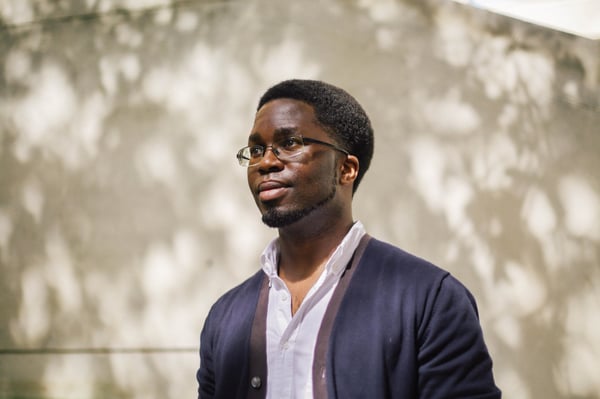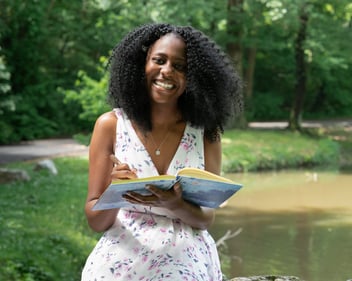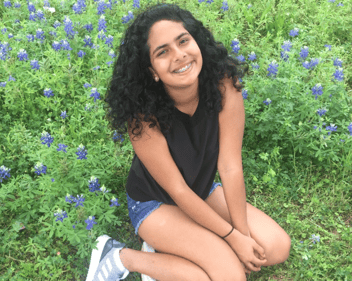In our endlessly busy world, it can seem that efficiency is prized above all else—but as our Poetry & Spoken Word Competition Guest Judge Jacob Sam-La Rose tells us, writing, especially writing poetry and spoken word, is when we need to let go of our preoccupation with efficiency and welcome in a little chaos in order to do our best work: “Mess is where the actual discovery happens. And when we’re writing creatively, that sense of discovery is what we want to be aiming for; that sense of arriving at something that we didn’t know that we knew or felt before we wrote it, but when the words fall into place, it’s something solid and real.”
Read on for more of his insights and tips to take your poem or spoken word performance to the next level!

You’re a poet, a writer, an editor, an educator. What draws you to poetry, and why do you think poetry lends itself to being performed aloud?
There’s so much to love poetry for! Personally, I’m drawn to it through a love of language, a love of the sonic qualities of language, the music of it, the way words feel in the mouth, and the way those words can be strung together to make something that means something, something that doesn’t depend on narrative, but can still capture some aspect of human experience that’s raw and true. I also appreciate the way poems can offer windows into the way people think and feel about things. Many of the poets I grew up admiring were poets whose poems celebrated lived experience, and I came to appreciate this way of seeing their worlds through their words.
In terms of why poetry lends itself to performance—there’s the obvious consideration that the average poem is shorter and more self-contained than the average short story. And of course, so many of the tools in the poet’s toolkit are all about the power of sound and how the sound of any selected word or phrase might best support the poem’s intended sense. Not to mention the history of poet as griot*, the tradition of poetry as a repository for culture and cultural memory passed on and maintained through the act of performance …
When did you first start writing and performing poetry?
I started writing at an early age, in my early teens. That’s not to say that I was particularly gifted or precocious! I found a love for what writing could be and do, and I pushed myself to learn what I could. I went on to study literature, and during those studies I discovered a local poetry circuit. Before then, poetry had existed for me as a personal experience, a direct connection between myself and the words I might read on the page. Poetry events opened a different understanding of poetry for me, sharing space with people who all had an appreciation for poetry in common. That sense of poetry being a living thing that was shared between actual people was really important for my understanding of what poetry was capable of, and the value it might have.
Young writers can choose to either submit a poem, or a poem along with a spoken word performance to our competition; WtW member The Inky Writer asks, what is the difference between writing poetry and writing a poem intended to be performed out loud?
I’m probably one of the worst poets to answer this question! The audiences for a performed or written poem have different ways of interacting with that poem. The reader can pace themselves through the way they receive the text, they can stop, go back a line or two or even restart the poem and have that feel like a completely natural way of taking the poem in. We’d be far less likely to do the same for a performed poem, even if we have access to that poem as a recording. The performative moment tends to be far less naturally interruptible. And there are ways of writing with this in mind, engaging with a clearly discernible sense of structure, perhaps taking advantage of the power of repetition, not forgetting any of the sonic qualities of language I’ve alluded to already—rhyme, metre, and so on. But so many of these tools are available for all poets whether they’re writing poems to be read or performed. I’m really excited by poets who maintain an awareness of the various different ways that poems can be received and produce poems that draw from the best of all possible worlds. As a poet, I came up through a dichotomy of page and performance—you were either one or the other. I’m excited by the possibilities of not being so tightly hemmed in.
WtW member Skywalker5758 wants to know: when writing poetry, how should a writer go about organizing their thoughts?
The writer should organise their thoughts in whatever way serves their project or piece of writing best! And make sure to allow space for thinking before organisation. That might seem obvious—in order to organise your thinking, the thinking must exist in the first place. Sure. But I think there are ways in which we end-game writing projects; we want to find the quickest or most efficient way to arrive at a “successful” finished product, and it often helps to resist that drive. I’m a big believer in messy first drafts. Multiple messy drafts, in fact. I think engaging with that mess is where the actual discovery happens. And when we’re writing creatively, that sense of discovery is what we want to be aiming for; that sense of arriving at something that we didn’t know that we knew or felt before we wrote it, but when the words fall into place, it’s something solid and real. I think maybe I’m less of an organiser and more of a shuffler. I’m often wary of things that are too neatly organised too early on in the writing process for me. And I like to throw things up in the air to see if I can discover different, less expected ways of moving from one line, image or idea to the next.
Which poets are you taking inspiration from lately? What (outside of poetry) are you taking inspiration from?
R.A.Villanueva. Inua Ellams. A poet from one of my programmes, Sarah Lasoye, just sent me the manuscript for her first pamphlets, and I have to say that I was mightily inspired. Also Claire Wahmanholm. Erika Meitner—I keep returning to her collection Ideal Cities. And there’s a Shira Erlichman poem titled “How to Become a Forest Fire” that I have to read a few times each year. Oh, and Natalie Diaz’s collection Postcolonial Love Poem.
Beyond poetry? The season has shifted here in London, we’re being treated to an uncharacteristically balmy spring (shhh—don’t tell anyone in case someone realises it’s a mistake) and I’m learning how to appreciate light again. Light and shadow; angles of light at different times of the day. I’m thinking about picking up one of my cameras again, now that the outside world is legal again and I can take my thinking out on the road and walk aimlessly through the world without the justification of a sanctioned destination. Of course, there’s a lot more going on than light and aimlessness; so much more that could be the focus of a poem. But after the past year or so, light and aimlessness feel like as good a place to start as any.
Editor’s Note: a griot is a member of a class of traveling poets, musicians, and storytellers who maintain a tradition of oral history in parts of West Africa.





